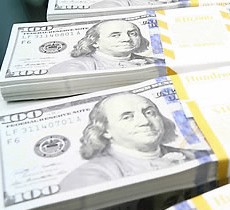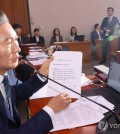- California Assembly OKs highest minimum wage in nation
- S. Korea unveils first graphic cigarette warnings
- US joins with South Korea, Japan in bid to deter North Korea
- LPGA golfer Chun In-gee finally back in action
- S. Korea won’t be top seed in final World Cup qualification round
- US men’s soccer misses 2nd straight Olympics
- US back on track in qualifying with 4-0 win over Guatemala
- High-intensity workout injuries spawn cottage industry
- CDC expands range of Zika mosquitoes into parts of Northeast
- Who knew? ‘The Walking Dead’ is helping families connect
Korean won sharply down vs dollar
SEOUL (Yonhap) — The Korean won fell sharply against the U.S. dollar Wednesday, hitting an over one-year low and moving in sync with the Japanese yen’s sharp slide against the greenback.
The won was changing hands at 1,099.30 to the greenback as of 11:00 a.m., down 7.70 won from the previous session’s close, marking the lowest since Sept. 2, 2013 when the comparable figure was 1,100.50 won.
The Japanese yen hit a new seven-year low against the greenback in London on Tuesday on speculation that Japanese Prime Minister Shinzo Abe may push back a consumption tax hike scheduled for next year and may call a snap election. The currency market was closed in New York on Tuesday for Veterans Day.
“A possible delay in consumption tax signals the Japanese government’s strong will to boost economy,” said Jun Seung-ji, an analyst at Samsung Futures Co.
The yen has been on a slide as a series of economic data supported the dollar’s rally and the Bank of Japan last week vowed to fight deflation with additional measures if necessary, following the monetary easing steps it took the previous week
The won-yen exchange rate reached a six-year high of 950.42 as of 11:00 a.m., up 5.15 won from the previous session’s end.
Last week, South Korean Vice Finance Minister Joo Hyung-hwan told lawmakers that the government will let the won move in tandem with the Japanese yen, signaling that the currency authorities may intervene if the won’s rise to the yen turns excessive.
The Bank of Korea, South Korea’s central bank, also has voiced concerns over the yen’s slide, saying that it will keep close tabs on the impact of the additional easing on South Korea’s economy and financial market.
This week, the central bank is scheduled to hold its monthly rate-setting meeting. Last month, the bank trimmed its policy rate to a record low of 2 percent to support growth in Asia’s fourth-largest economy.
















